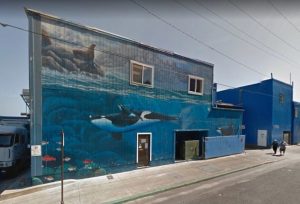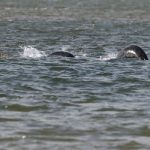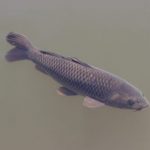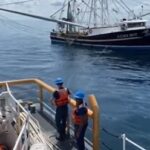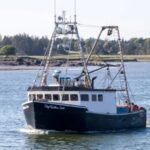Tag Archives: Bigelow Laboratory for Ocean Sciences

Are the whales leaving with the food? Gulf of Maine research raises questions about new lobstering rules
As the Gulf of Maine’s waters warm, recent studies show the main food source of the endangered North Atlantic right whale is moving north, out of Maine waters. And the whales appear to be following them. Such findings haven’t escaped the notice of the Maine lobster industry, which has been referencing them in its legal arguments as to why impending new federal restrictions on lobstering gear won’t help save the whales. Oceanographer Jeffrey Runge, of the University of Maine and the Gulf of Maine Research Institute, said the lipid-rich copepods have been abundant in the Gulf of Maine since Henry Bigelow did his first oceanographic surveys in the early 20th century, but that abundance has dropped by about 70 percent in the past 20 years. >click to read< 11:57

Marine Biologist Spencer Apollonio of Boothbay Harbor, has passed away
Spencer Apollonio passed away unexpectedly on March 8, 2022 at his Boothbay Harbor home at age 88. He was born in Camden to parents Dr. Howard L. and Helen T. (Martin) Apollonio. A marine biologist and Fellow of the Arctic Institute of North America (AINA), Spencer made 14 trips to the Arctic. Spencer served as Commissioner of the Maine Department of Marine Resources (DMR), chairperson of the Atlantic States Marine Fisheries Commission, and executive director of the New England Regional Fisheries Management Council. He started his career researching shrimp (Pandalus borealis) and other marine life, and later focused on fisheries management in the Gulf of Maine. A graduate of Bowdoin College, he received a master’s degree from Yale University. >click to read< 21:23
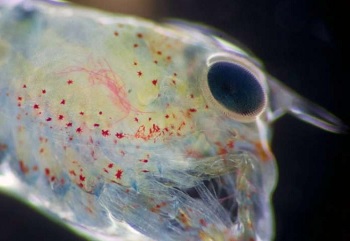
Study: Microplastic fiber pollution harms lobster larvae
A study published in the Marine Pollution Bulletin reports that the fibers affect the animals’ feeding and respiration, and they could even prevent some larvae from reaching adulthood. “Lobsters play a fundamental role in the Gulf of Maine ecosystem as well as the state’s economy, and it is important that we understand how pollutants impact their development.” Young lobsters grow to adulthood through four distinct developmental stages, and the researchers found that the physiology of each stage determined how the animals interacted with plastic fibers. The youngest lobsters didn’t consume them—but they were plagued by fibers accumulating under the shells that protect their gills. >click to read< 16:04
Researchers: Global Warming Could Wipe Out Maine Lobsters in 85 Years!
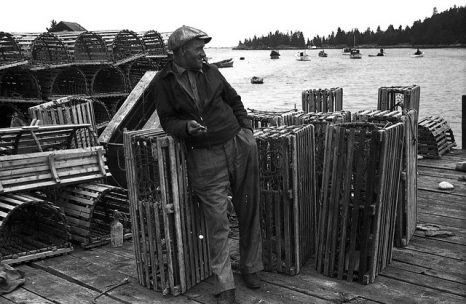 The Gulf of Maine is warming at an alarming rate. Research by the National Oceanic and Atmospheric Administration shows ocean temperatures are rising at three times the rate of global averages. This increase in temperatures is linked to the collapse of the New England cod population, and new research shows the fate of the Maine lobster is likely similar. A new report from the University of Maine Darling Marine Center and the Bigelow Laboratory for Ocean Sciences predicts the Maine lobster population will be wiped out by 2100 due to climate change. The study examined how lobster larvae are impacted by rising ocean temperatures and ocean acidification. Although acidification seems to have no significant impact on the larvae, warming temperatures are a different story. Lobsters reared in water that is 3 degrees Celsius warmer than current temperatures in the western Gulf of Maine had bleak survival rates. Read the rest here 11:51
The Gulf of Maine is warming at an alarming rate. Research by the National Oceanic and Atmospheric Administration shows ocean temperatures are rising at three times the rate of global averages. This increase in temperatures is linked to the collapse of the New England cod population, and new research shows the fate of the Maine lobster is likely similar. A new report from the University of Maine Darling Marine Center and the Bigelow Laboratory for Ocean Sciences predicts the Maine lobster population will be wiped out by 2100 due to climate change. The study examined how lobster larvae are impacted by rising ocean temperatures and ocean acidification. Although acidification seems to have no significant impact on the larvae, warming temperatures are a different story. Lobsters reared in water that is 3 degrees Celsius warmer than current temperatures in the western Gulf of Maine had bleak survival rates. Read the rest here 11:51
Warming waters a major factor in the collapse of New England cod, study finds
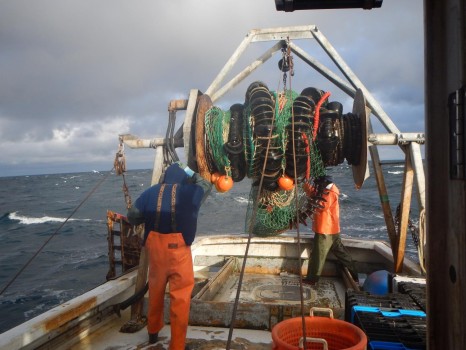 Pershing and colleagues from GMRI, the University of Maine, Stony Brook University, the Bigelow Laboratory for Ocean Sciences, and NOAA’s Earth System Research Laboratory, including the Cooperative Institute for Research in Environmental Sciences at the University of Colorado Boulder, found that increasing water temperatures reduce the number of new cod produced by spawning females. Their study also suggests that warming waters led to fewer young fish surviving to adulthood. Read the rest here 18:04
Pershing and colleagues from GMRI, the University of Maine, Stony Brook University, the Bigelow Laboratory for Ocean Sciences, and NOAA’s Earth System Research Laboratory, including the Cooperative Institute for Research in Environmental Sciences at the University of Colorado Boulder, found that increasing water temperatures reduce the number of new cod produced by spawning females. Their study also suggests that warming waters led to fewer young fish surviving to adulthood. Read the rest here 18:04
Gulf of Maine: ‘Poster child’ for global warming
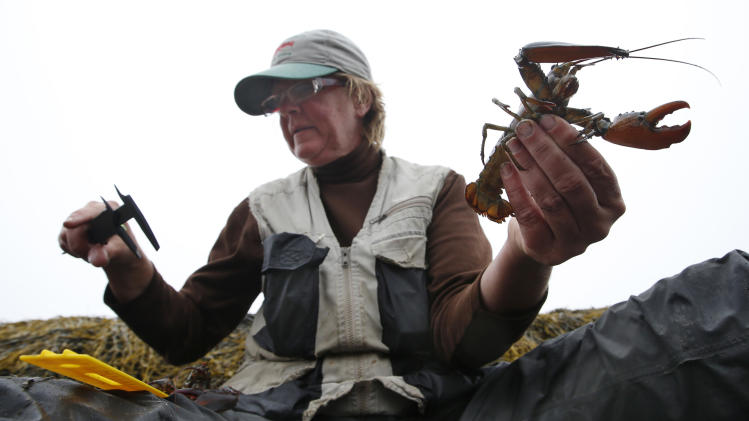 Long-established species of commercial fish, like cod, herring and northern shrimp, are departing for colder waters. Black sea bass, blue crabs and new species of squid — all highly unusual for the Gulf — are turning up in fishermen’s nets. The Gulf of Maine’s warming reflects,, Lots of info that appears to be new.BH Read the rest here 07:54
Long-established species of commercial fish, like cod, herring and northern shrimp, are departing for colder waters. Black sea bass, blue crabs and new species of squid — all highly unusual for the Gulf — are turning up in fishermen’s nets. The Gulf of Maine’s warming reflects,, Lots of info that appears to be new.BH Read the rest here 07:54
Project to forecast Maine lobster season seeking NASA funding
 A research proposal from the Gulf of Maine Research Institute and the Bigelow Laboratory for Ocean Sciences aims to use Earth-system data to predict the movements of species along the Maine coast. Read more here kennebecjournal 16:16
A research proposal from the Gulf of Maine Research Institute and the Bigelow Laboratory for Ocean Sciences aims to use Earth-system data to predict the movements of species along the Maine coast. Read more here kennebecjournal 16:16





































